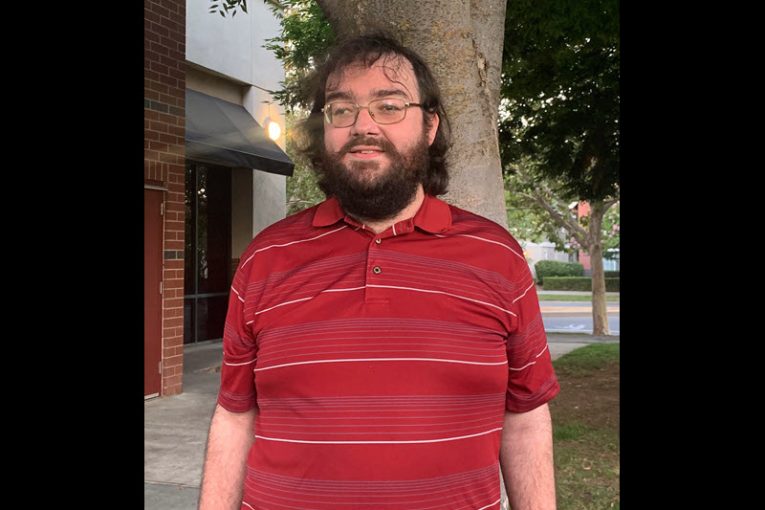

By David M. Greenwald
Connor Gorman has been a fixture during public comment at City Council meetings or, as he put it, “involved in local political things for quite awhile”—including labor organizing through UC Davis worker’s union, direct action organizing, and event city politics through the “No DAPL” movement where activists successfully pushed the city to divest from Wells Fargo.
“I started going to city (council meetings) more regularly and got invested in it, especially around issues of housing and policing,” he said. He called running for office “a good next step.” He sees this as “a good way to attempt to influence the city’s decision making.”
Gorman is one of four candidates in the open South Davis, 5th District race along with former councilmember Rochelle Swanson, Josh Chapman, and fellow graduate student Kelsey Fortune.
He’s a newcomer to Davis, having arrrived in 2013 as a graduate student in physics. He studies physics education and specifically class size effects on education in physics. He came here studying quantum gravity, but switched in his third year, partially because physics education research seemed to better align with his activism. Smaller class sizes was also one of the demands in the 2013-14 contract.
He hopes to graduate soon but remains very interested in local politics.
“I’m down to stay here and get more involved in that scene in a more formal way through city council if I win in November,” he said.
From physics to labor organizing, he explained, “I have been a leftist for quite a while,” starting in high school and undergrad.
But he came here in September 2013, and went on strike in late November over the contract issue. “I think that was definitely part of it—being involved in a strike from the beginning,” he said. “But I was headed that direction anyway.”
He became a head steward in the student workers union his second year. That involvement got him involved in other groups and other activities as well.
Two big issues for him are policing and housing.
Connor Gorman describes himself in the “PHIMBY” camp. NIMBYs are generally opposed to development, according to Gorman. YIMBY’s are generally supportive of development. PHIMBY, on the other hand, “stands for public housing in my backyard.”
His idea: “We need housing and we need development, but we would like it to really like it to serve our communities, especially the most marginalized in our community.”
First, “We would like to see more direct democratic public projects, especially housing.” He cited things like co-ops and public housing that are “run in a democratic community-oriented way” and not with a private landlord.
But he also acknowledges that in the current society “we are not going to house everyone in democratic public housing,” he said, “when it comes to development, pushing for better projects.” He said, “What the developer usually comes with is not the most they’re willing to give. Generally with enough pressure we can push them to provide more.”
He especially wants that push “around affordability,” which he says he is most concerned with, but “other stuff as well.” Environmental measures in particular.
On policing, “we should start redirecting resources from policing to public safety.” He said, “I would like to create a department of public safety that’s independent of the police.” He said, “Anything that’s under the police is subject to the culture, the budget and the command structure of the police department.”
He is pushing for a separate department of public safety that covers homelessness, substance use and mental health crisis—respite centers as well.
“It would have its own decision making processes and its own budget,” he said. He supports the homelessness outreach coordinator but not under the police department. He would expand on the use of the coordinator, just not under the auspices of the police department.
Gorman said, “The idea would be to start redirecting resources from the police department.”
He also wants to end the armored vehicle contract “and redirect the funding to other things as well.”
He wants traffic stops outside of the police department—nor does he want it under public safety.
Homelessness is another big issue—he sees that as an intersection of housing and public safety. He said, “Generally I support a housing first approach where the idea is that you provide people with housing even if they still have other issues to be addressed.” He sees them as more likely to be receptive to those services if they’re housed already.
Finally, the downtown and businesses in general. He wants to look into “commercial rent control” or a vacancy tax. The downtown, he points out, is owned by a few large landowners. A lot of the small businesses in town rent their property.
“Having some kind of rent control for downtown businesses could actually be a way of keeping businesses—especially the smaller, more local ones—in place,” he said.
—David M. Greenwald reporting


What do you call someone who (generally) advocates for slow-growth, even when it’s not right next to them? (No, that’s not a set-up for a joke.)
Is that possible?
Seems like an interesting guy. Not too many physics (and former “quantum gravity”) students in politics, I’m guessing.
Actually, the implication of that term is that they’re just fine with development that doesn’t occur in their immediate neighborhood. Developers know that, and are sometimes able to enlist their help as a result.
NIMBY’s are not always the same as slow-growth advocates.
Ultimately, most people have at least some “NIMBY” in them. Even development activists.
Lots of details here that are notably a seamless part of their lifework — and by the way, EVERYTHING is a sub-category of physics. Do we see that with the other candidates, at least with the issues mentioned?